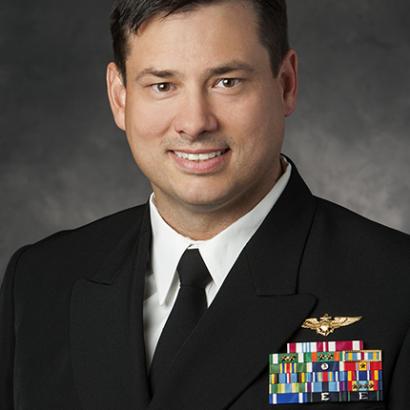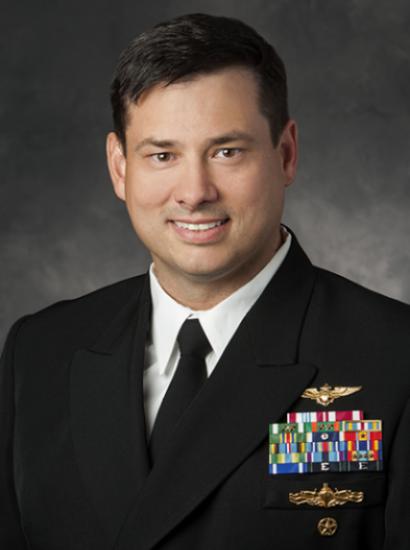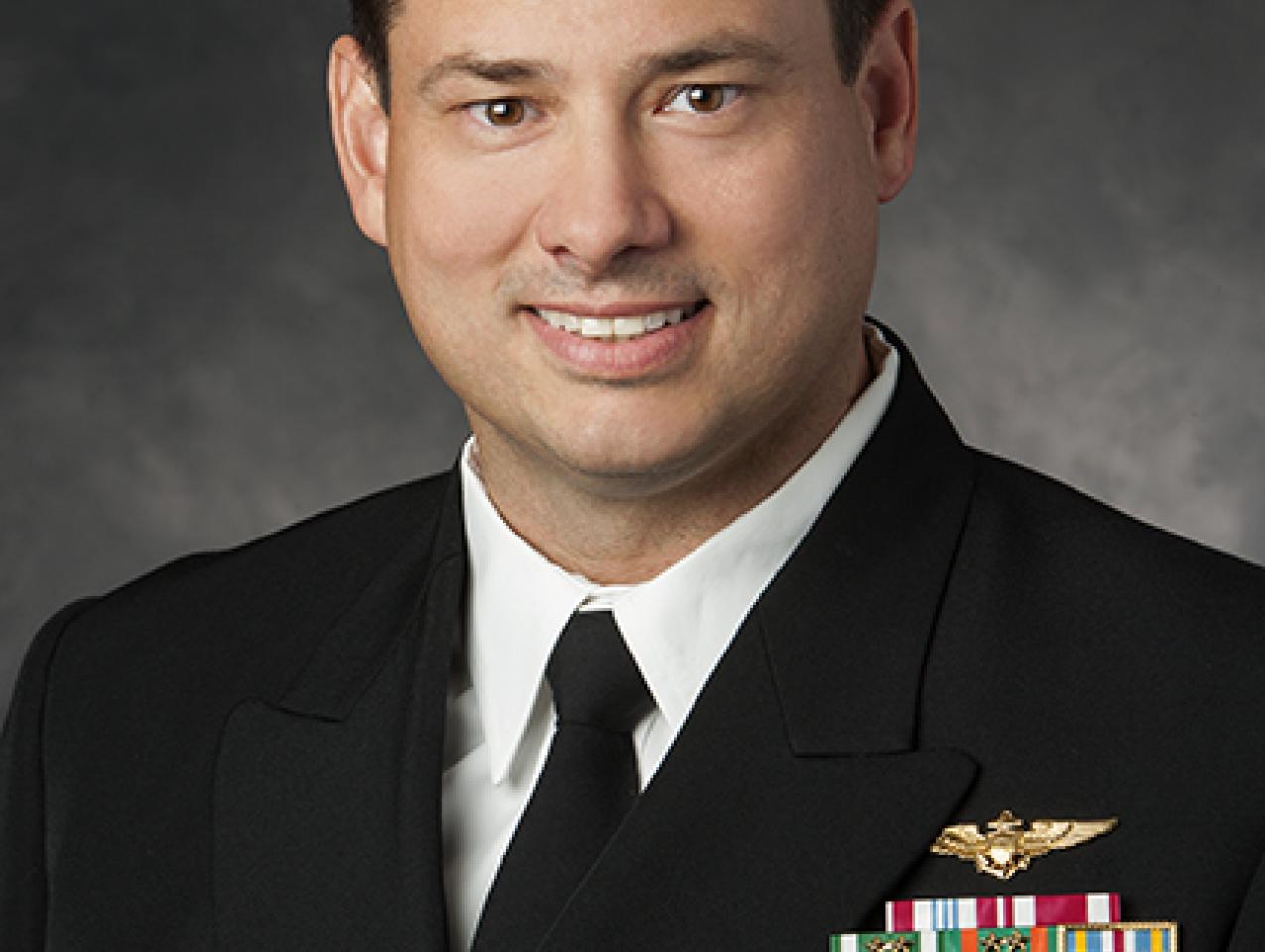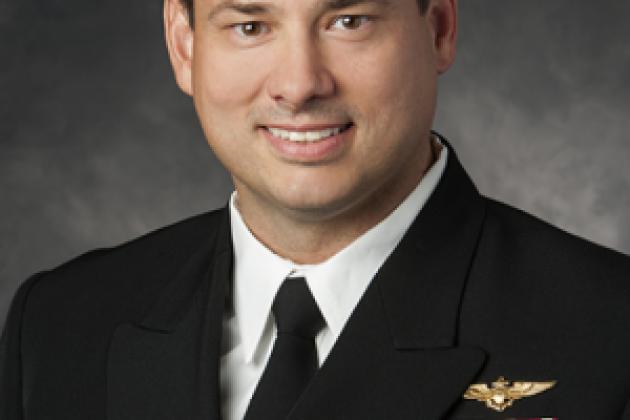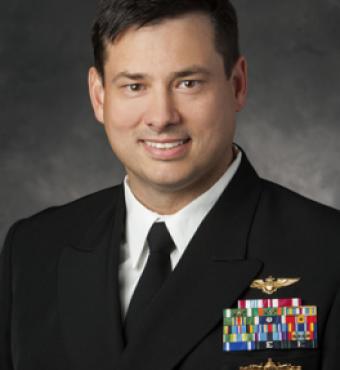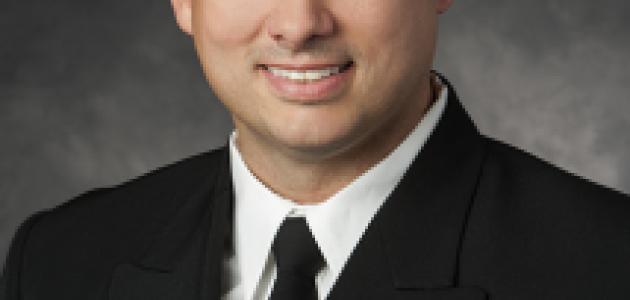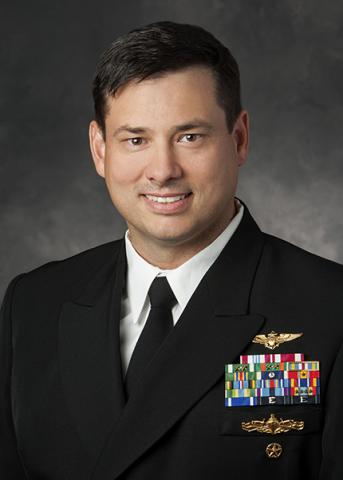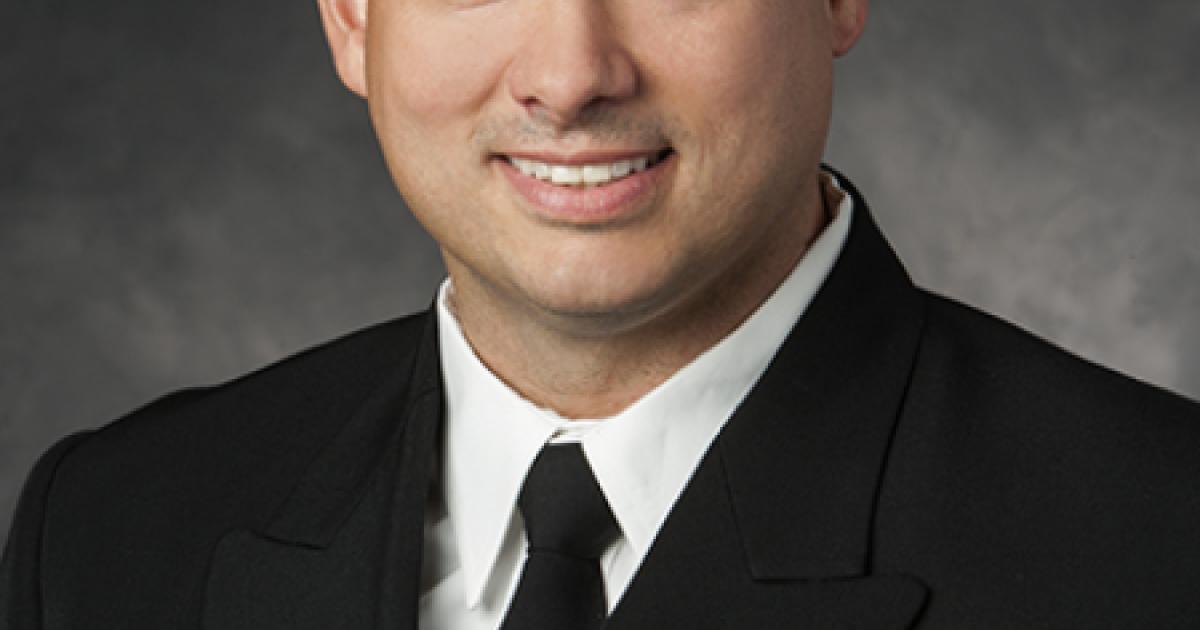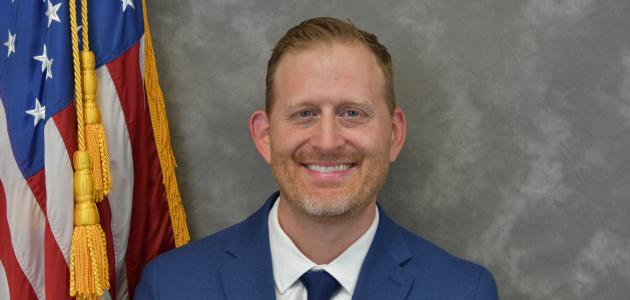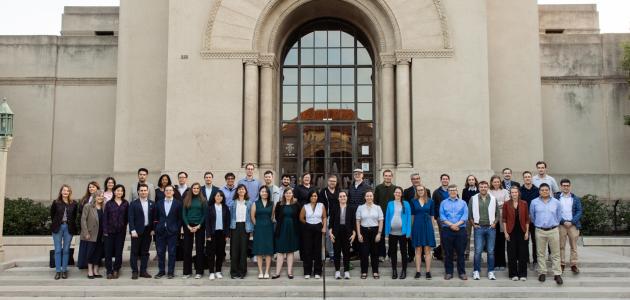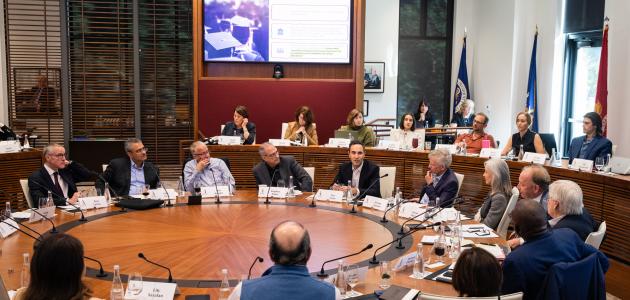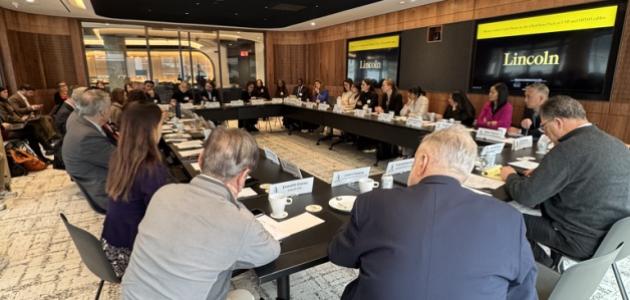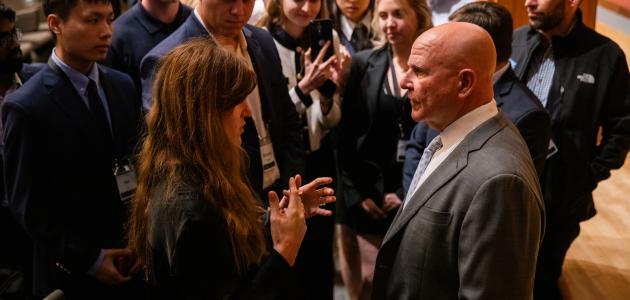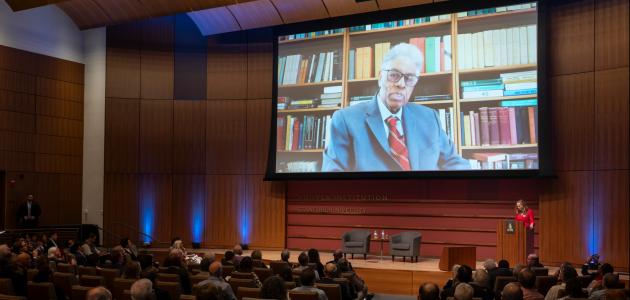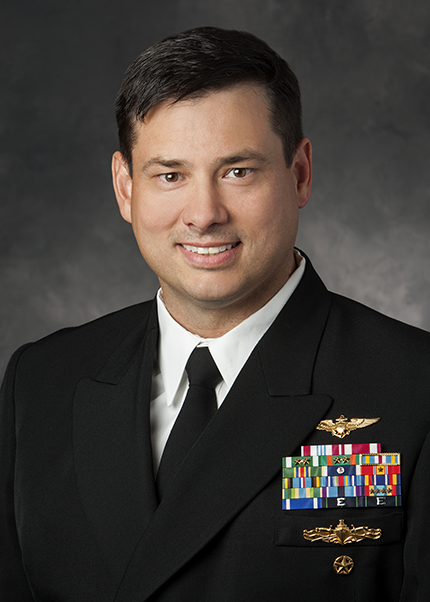
As any diligent reader of Hoover stories would know, our National Security Affairs fellows this year are a particularly jovial bunch. Commander Steve Newlund is no exception, showing his amiable side for his featured interview in a fast-paced yet light Texan drawl. Newlund is representing the US Navy for the 2013–14 academic year at the Hoover Institution. A graduate of the United States Naval Academy at Annapolis, he has served as a ship navigator in the Mediterranean and a naval aviator in the Western Pacific and the Middle East. Steve counts his most significant career milestone as serving as the commander of Patrol Squadron FOUR, based at Kaneohe Bay, Hawaii. For his year at the Hoover Institution, Newlund is particularly concerned with an immediate maritime Artic solution. His project will document how Maritime Patrol Aviation is a relevant and durable option for the nation’s Artic Ocean policy.
Newlund generously agreed to sit down to share his experiences in the military and the Hoover Institution. This is part of a series featuring National Security Affairs Fellows from the 2013–14 academic year.
Why did you join the navy?
I grew up in Texas in a small town with small-town values. I did not want to be like everybody else, and I felt a deep sense of patriotic duty. Both my father and grandfather were in the army. My other grandparents both worked in an ammunition plant in Oklahoma during WWII. Every single one of them was proud of their service, and I believe that it was instilled in me as a small kid. I always felt the need to serve. I intended to enlist in either the marine corps or navy. Fortunately I made a good impression on my member of Congress who enabled me to go to the Naval Academy after high school graduation. Not only did I get to serve in the navy but as an officer. Things kind of took off from there, I guess.
If you hadn't joined the military, what career would you have chosen?
I think architect. I always loved building things. I enjoyed drawing, sketching, and structure design. I am pretty sure that's what I would have been.
How many years have you been in the military?
Twenty-two as an officer with another four at the Naval Academy.
And how many deployments have you had and where?
I have deployed seven times; two to the Mediterranean Sea on board ship when I was a surface warfare officer. I’ve deployed three times to Japan and twice to the desert as a P-3 pilot. Desert deployments have been everywhere, from Iraq, Bahrain, Oman, and other places; all of my WESTPAC deployments have been all over, from Japan proper, Okinawa, Philippines, Australia, South Korea, Thailand, Tonga, and some other bizarre and crazy places. Forty-three countries all together in my twenty-six years.
That's impressive.
It's probably more than most. It's almost a bumper sticker that I use for explaining my life…Talk about adventure and some of the things you've seen and done. My recruiting pitch is that I, myself, have deployed a lot, and although I am not necessarily happy to be away from my family, it certainly has enabled me to see a lot of interesting and unique places.
Do you have forty-three crazy stories to go with each?
Yes, I do. I mean, that's the fun part of being in the navy.
It makes good bedtime stories for when you're home, maybe?
My kids love it. And I don't want to bore you with it, but my kids love impersonations. I really like learning and observing other cultures, and I try to pick up subtle nuances from their body language and how they talk and interact… and I always try to pick up a little bit of their accents. And so, you know, I'll tuck my kids into bed with different accents. I am always trying to learn how to say goodnight and good-bye and all of those kinds of things in every language from where I've been. I have forgotten a lot of it. But I've still retained some, so it's still fun, for me at least.
Sounds like it! Let’s go back to my standard questions. What was the biggest challenge of your career and why?
Well, the biggest challenge of my career was during my last squadron tour. Prior to assuming command of my squadron of almost four hundred people, we had about nine months to get ready for another deployment and we had this enormous aircraft maintenance inspection to get through. Our maintenance department was in bad shape after the collapse of a consolidated maintenance concept upon our return from Iraq. We were not very good and had an unusually high turnover of personnel. We had very few senior enlisted as compared to other squadrons. Good bones–we tried really hard. But we lacked focused and consistency; it was going to be a big problem during the inspection and on the next deployment. The previous CO and I gathered some of the officers and most senior enlisted together to formulate a plan of how we were going to solve our potential crisis. Then we put the right people in play, monitoring the progress and really focusing on the team. Lastly, we let them get to work. Their confidence soared. As a squadron we really turned it around when we aced the inspection and deployed six months later with some fantastic maintainers and the best airplanes in the fleet. On deployment we flew somewhere in the ballpark of 850 to 900 missions in six months. We missed only three missions. So, pretty remarkable results considering we were flying a really old airplane. The P-3 is anywhere between 30 to 45 years old depending on which tail number you have. Bottom line, if it wasn't for those guys and their hard work, it would have been very easy to miss up to 10 percent of those missions. But we didn't. They were smart young sailors with amazing hearts and tenacious spirits. It was one heck of a good team.
What was it like to adjust from your last job to the fellowship?
Easy. (Laughing)Easy initially… My last job was manpower. I had 60-hour workweeks essentially in a tiny cubicle. Fifty hours during a good week, all work where I sat in front of the computer with a couple of screens and phone with a wireless headset. I was in charge of detailing and managing the careers of some 750 naval aviator captains, all of whom were all senior to me. They all had opinions of what jobs they needed to do. And I had the luxury of telling them no, or yes, or we should do this. Very difficult—always on the phone. Almost every navy captain has a blackberry, so the e-mail and phone calls would never stop. On a daily basis, I would write about seventy-five proper e-mail responses to the 100 to 125 daily e-mails. And, since they were all senior to me, they all expected answers.
Here, I get about 20 e-mails a day, of which a few require a response. But the difference is it's a different part of the brain. I'm not using the operational, life and death side of my brain as often. I'm using a different part of it where I'm actually thinking through things and developing my thoughts. My first month here, I slept less than I slept in my previous job…. Part of my brain has just been reawakened.
What does leadership mean to you? And how do we develop it in others?
I would say that leadership is the ability to get a group of people to focus on a problem, act as a team, and kick butt while doing it. It relies on a couple of things. The first is that it is a tailored approach to the situation that you're in, to your challenges and to what your mission is. But it also needs to be tailored to the individuals that you're leading. So, to me, the leadership is always tailored. The second trait is that leadership is always best if it is personal and from the heart.
We ask a tremendous amount of the members in the military. I have always felt that I should know something about every one of my guys because I'm going to ask them to do some pretty tremendous things. Some pretty extraordinary things and difficult things. If I don't know them well or if they don't know that I would be right there with them in the thick of it, the chances of them accomplishing that or having the drive and desire to meet their full potential is at risk. As a result the organization may suffer. In the military, that may be life or death.
And then I always think that good leaders have to be able to communicate. You need to be able to define and explain and focus on things that you can control. Communicate again. One of my favorite COs once told me that your goals need to be definable, explainable, and achievable. Don't have unrealistic expectations. But you sure as heck better be able to describe it so that everyone can understand what the mission is.
How to develop it in others?
One needs to set the right example, and create an environment where people can succeed. It is also important to allow people to work through problems. Don't always give them the answer. Allow them to succeed and fail. It's okay, so long as it isn’t life and death. If you know what the boundaries are, sometimes failure is not a bad thing. I think we all learn from it. Give them the problem; allow them to provide and execute the solution. You can set the stage for them to have that opportunity to be leaders by putting them in leadership roles. It doesn't just come with the rank; it can also come with the job.
What do you like to do in your spare time?
My spare time is devoted to whatever my kids are doing. Whether it's kicking or throwing a ball with them, Scouting, going to a sporting events, hiking, riding bikes; I do pretty much whatever my kids want to do. We're really good about having dinner every night together. And we do it very consistently, a real tribute to my wife. We are always trying to see and experience this part of the country, because it's the first time we have been stationed in California.
What's a funny story about your fellow NSAFs that you would like to share? I've been told to ask you about a bicycle.
Okay. Five of the six of us ride bikes, with three of us riding bikes to work and, in my case, doing anything to avoid the 101. My bike is a behemoth nicknamed Harry Potter. It looks very distinguished and old. The thing weighs 40 pounds. It is a real beast of burden. It also has served as our tailgate 5 ton. We have hauled people and close to 45 pounds of stuff on it. Other bicycle stories probably involve injuries and near misses with inanimate objects or electric buses.
I heard the “you guys got drenched” story, too.
(Laughing) I was coming to that game with family. And that downpour happened. My wife looked at me and she says, “really?” So, I’m like (sighs dramatically) kind of a little pouty because I really wanted to get to tailgate eat with my friends. And so we pulled into a restaurant and ate dinner waiting for the rain to clear. When we finally pulled into the game we were the only dry ones. Everyone else was just like drowned rats. As usual, my wife was right!
That’s funny. Going back to the bike…I’m not sure what a Harry Potter bike is.
It is upright. So, it's kind of like riding a motorcycle. I have the springs in the seat. I have this panel that protects the back tire so that I can have panniers hanging out the back. It has lights that light up automatically with dynamos. It's a beast. And you put me on it in a helmet, and I am sure that it looks hysterical, so I guess that's the funny part. I may have crashed the bike once. But that can’t possibly be where they're going with it?!
Anyway, I think the best part about this group of guys is that there are so many distinct personalities and yet it is very easy for us to talk and to communicate. We are a very cohesive and gregarious group. Not one of us has any issue pointing out the fault of another.
But I think the funniest thing is that none of us can dress. Not one of us. Even the guy who thinks he's really suave, Roy (side note to our reader – Roy discussed his own fashion difficulties in his NSAF profile, which you can find here)…. We’re grown men without any fashion sense or knowledge of what's cool. I've worn a uniform my entire life, since the age of 18. Well, I guess the fashion from when I was 18 is back in style. So, it's kind of bizarre.







